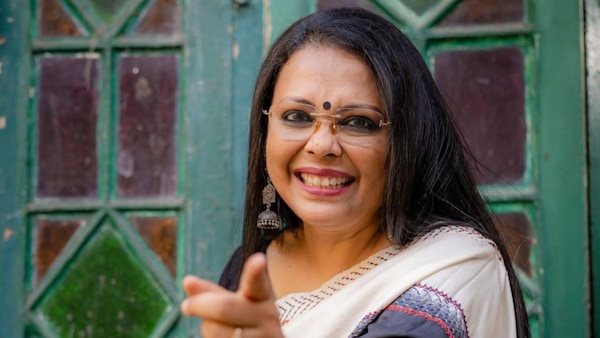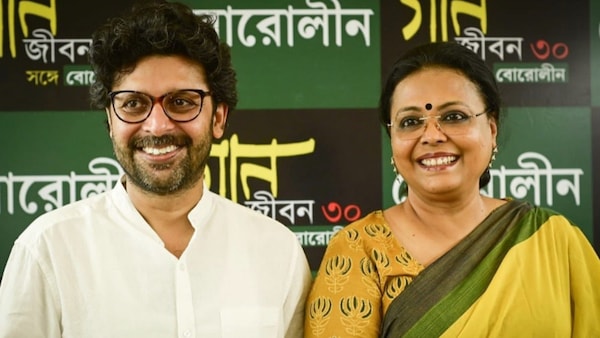Exclusive! Lopamudra Mitra: Earlier, artistes used to shy away from promoting themselves. Now it is all about marketing
The singer opens up about her 30-year-long musical journey.

Last Updated: 12.21 AM, Sep 04, 2022
Lopamudra Mitra has completed three decades of her musical career. On September 3, the singer hosted a concert to celebrate her journey in the industry with her fans. It was a packed auditorium at Rabindra Sadan where she churned out her hit numbers. From Jao Pakhi to Amar Protibader Bhasha and Amar Mawte – the singer presented a soulful musical evening. She ended the show with her all-time-hit Benimadhab, followed by Vande Mataram. Lopamudra captivated the audience with an interactive show. “We are artistes. It is important for us that the king/ queen (those who are in power) helps us. Without them, we cannot do what we do best – practice our art form. Hence, it is not always possible to speak up. We can create music and that I do diligently,” she said. The singer also spoke exclusively with OTTplay about her journey, memories and regrets. Read on…
You were very busy with the show…
Yes, I was very busy. A lot of things were happening. I was unwell only a week ago and I could not work for a few days. And we spent days rehearsing and preparing. But to be honest, I like it. I was enjoying every moment of this. Initially, I was panicking about the response. However, now I am overwhelmed by it. So many people were interested and it was a full-house show.
You are one of the very rare female vocalists in Bengal whose original/ basic songs are more popular than film songs. You owe your fame to non-film numbers, isn’t it?
Yes, Basic songs made me popular. Kabir Suman asked me to sing a song in his Shedin Choitramash. I recorded Surjo Taake Dekhte Chaaye. Obviously, Amar Mawte, from Hemlock Society, became a hit. But I didn't indeed get a lot of playback offers. In fact, Sumanda, Nochida (Nachiketa Chakraborty) and several others became hugely popular at that time because of their basic songs. They also did not do a lot of playbacks at that time. I have accepted the fact that playback has not been a success story for me. I am at peace with this fact. I don’t think much about it. The more you think, the more it gets complicated in your head.
You always talk about Samir Chattopadhyay’s contribution to your life…
Kaka (Samir Chattopadhyay) was my mentor. From my studies to my music learning journey, forming worldview — his contribution is everywhere. I miss him every day. Joy (Sarkar, husband) came into my life a little later.
Two years of the pandemic have upset the lives of live musicians. Your career is built over live music. How did you manage?
It was not easy. First of all, two music reality shows on TV helped me financially. However, there were many other fallouts. I have a team and due to the lockdown, we all suffered together. I also run my fashion line, Protha, and suffered during the pandemic. Also, because I did not perform live for long, I lost practice a little. Hence, I was a little nervous for today.
Also, I am a person who lives her life in full gusto. However, After the pandemic, I became a little timid. I used to roam around freely, visiting places all alone. Now I have become a little shaky.
You and Joy are known to be diametrically opposite, what is the secret of your successful journey?

We are very different and that worked in our favour. Joy is calm and I am brave. Joy is wiser than I am. Above everything else, it is our music that ties us closely. Another success mantra for our relationship is that we stay away from each other’s business. We never interfere.
Your fondest memory in 30 years…
It goes without saying that I have a lot. I remember Sandhya Mukhopadhyay called me personally at the beginning of my journey. I was thrilled. Also, I remember in 1997, I was just beginning. In Konnagar, I was singing Benimadhab and Manna Dey entered the show. He was supposed to sing at the gig. He stopped and listened to the song. And after that whenever we performed in a show, he sat in the wings to listen to Benimadhab.
Any regrets in 30 years?
No. I am not a person who regrets in general.
(After a pause) My father did not want me to pursue music as a career. I did and he wasn’t happy. Later, he committed suicide. I used to have problems accepting that. But I did. Now I have made peace with the fact that he had his problems and dealt with those in his way. Also, I wish I could learn music a little more. I wish I could get music training from abroad.
What are the differences in the industry you noticed?
Earlier, music used to be more interactive – concerts, cassettes, albums, etc. Now music lives in the cloud. When I started my journey, reaching out to my audience with my music was the label’s responsibility and not mine. Now it has completely changed. Now it is all about marketing and promotions. Earlier, artistes used to shy away a little from promoting themselves. Now it is just the opposite. There was a time when only good music would suffice. Now music means much more than just singing good songs. How you look, walk on stage, present your song and all the other paraphernalia became important.
Subscribe to our newsletter for top content, delivered fast.
